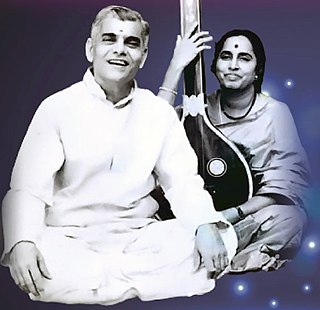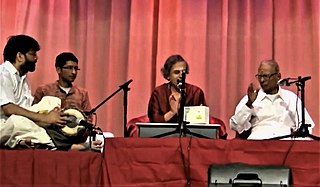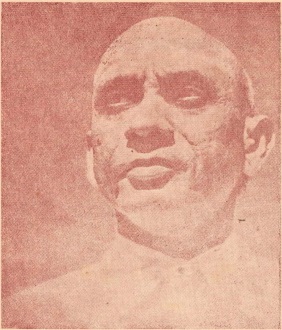
Semmangudi Radhakrishna Srinivasa Iyer was an Indian Carnatic vocalist. He was the youngest recipient of the Sangeetha Kalanidhi awarded by the Music Academy in 1947, a distinction he holds to this day as of 2023, probably the only musician to receive that honour before reaching 40. He had received many other awards as well, including Padma Bhushan and Padma Vibhushan from the Government of India, Rajyasevanirata title from Travancore's erstwhile ruling family, Sangeet Natak Academy award (1953), Isai Perarignar from Government of Tamil Nadu and Kalidas Samman from Government of Madhya Pradesh. He was affectionately addressed as "Semmangudi Maama" by his disciples. He was also considered the "Pitamaha" or the grand sire of modern Carnatic Music. He was conferred with an honorary doctorate by University of Kerala in 1979.

Madras Music Academy is one of the earliest established music academies in South India. Before the concept of infrastructure was introduced to India in the early 1920s, it was a gathering for elite musicians simply called Music Academy It plays an important role in encouraging and promoting primarily the Carnatic Music Indian art form. It played a vital role in the revival of the Indian classical dance form of Bharatnatyam in the 1930s when it faced near extinction due to a negative connotation caused by conservative societal standards.

Harikesanallur Muthiah Bhagavatar, commonly known as Muthiah Bhagavatar, is one of Carnatic classical music's famous twentieth-century composers. He also created about 20 ragas.

Palghat Kollengode Viswanathan Narayanaswamy, often referred to as K. V. Narayanaswamy was an Indian musician, widely considered to be among the finest Carnatic music vocalists of the 20th century. He was awarded the Madras Music Academy's Sangeetha Kalanidhi in 1986. He was described as the "Perfect Knight" of Carnatic music, a phrase from Geoffrey Chaucer, by V. K. Narayana Menon, art critic of India and recipient of the Sangeet Natak Akademi Fellowship.

Narasimhan Ravikiran is an Indian slide instrumentalist, vocalist, composer, and orator, who created the concept of melharmony. He is the son of gottuvadhyam player Chitravina Narasimhan and the grandson of Narayan Iyengar, who was also a Carnatic musician.
Trichy Sankaran is an Indian percussionist, composer, scholar, and educator. He was awarded the Madras Music Academy's Sangeetha Kalanidhi in 2011. As a mridangam vidwan, he has been called a "doyen among the percussionists of India" in Sruti magazine. Since the early 1970s, he has performed and recorded in a number of cross-cultural projects. In 2017, he was awarded the "Tiruchirapalli Carnatic Musicians Lifetime Achievement Award".

Musiri Subramania Iyer was a Carnatic vocalist whose stage performing career spanned the 1920s to the 1940s. After retirement from the stage, he remained an iconic figure in Carnatic music as a dedicated teacher and leader in the Carnatic community. His bhava-laden renditions of Carnatic songs have become the measuring stick for generations of Carnatic vocalists. Musiri Subramania Iyer is considered one of the giants of Carnatic music in the twentieth century.
Manakkal Rangarajan was a Carnatic music singer who hailed from the village of Manakkal in Trichy District. His father was the late Santhana Krishna Bhagavathar. He had been singing for more than six decades and was performing even past his 80th year. He died on 26/2/2019 due to old age of 96.

Thodur Madabusi Krishna is an Indian Carnatic vocalist, writer, activist, author and Ramon Magsaysay awardee.

Umayalpuram Kasiviswanatha Sivaraman is an Indian musician and exponent of the Carnatic percussion instrument, the mridangam. He is a recipient of the Padma Vibhushan as well as the Sangeet Natak Akademi Award.
Palghat R. Raghu was a Carnatic musician and percussionist. He was awarded the Madras Music Academy's Sangeetha Kalanidhi in 2007.

Rudrapatna Krishnashastri Srikantan, known as R. K. Srikantan, was a vocalist of the Carnatic musical tradition of South Indian music. He was awarded the Madras Music Academy's Sangeetha Kalanidhi in 1995.

Lalgudi Gopala Jayaraman Radhakrishnan, popularly known as G. J. R. Krishnan or Lalgudi Krishnan, is a Carnatic violinist, vocalist and composer. He is the son and disciple of the legendary maestro Lalgudi G. Jayaraman. Over the years, Krishnan has nurtured and propagated the legacy of the Lalgudi Bani, while also blending his own artistic elements. His style is defined by technique, bhava, laya, and a philosophical adherence to the notion that the violin must closely mimic the human voice. Lalgudi Krishnan was awarded with the Sangeet Natak Akademi Award in 2015. This is the highest Indian recognition given to people in the field of performing arts. Along with his sister, Lalgudi Vijayalakshmi, the duo was honored with the prestigious Sangita Kalanidhi award from the Madras Music Academy in 2022. This is considered the highest accolade in the field of Carnatic music.
The Rudrapatnam Brothers are an Indian Carnatic vocal duo, consisting of brothers R. N. Thyagarajan and Dr. R. N. Tharanathan. The brothers come from a family of musicians from Rudrapatna village off the Kaveri banks in Arkalgud Thaluk of Hassan district in the southwest Indian state of Karnataka. Vocalist Tiger Varadachariar, on seeing the musical atmosphere there, once claimed that "Rudrapatnam is the Thanjavur of Karnataka". Music, Veda adhyayana, and studying Sanskrit were integral parts of their family tradition.

Vellore G. Ramabhadran was a Mridangam artiste from Tamil Nadu, India. He was awarded the Madras Music Academy's Sangeetha Kalanidhi in 2004.

Mudikondan Venkatarama Iyer was a South Indian Carnatic music singer and musicologist. He was also known as Mudikondan - the name of his native village.
Valayapatti A. R. Subramaniam is an Indian classical musician and percussionist, considered by many as one of the foremost prominent exponents of thavil also known as dolu, a traditional percussion instrument in Carnatic music, accompanying windpipe instruments such as nadaswaram, saxophone, clarinet, etc, and string instruments like violin, mandolin, etc. He was awarded the Madras Music Academy's Sangeetha Kalanidhi in 2009. He is a recipient of the Sangeet Natak Akademi Award. The Government of India awarded him the fourth highest civilian honour of the Padma Shri, in 2007, for his contributions to Music.

Kumbakonam M. Rajappa Iyer was a Mridangam Vidwan in the field of Carnatic music from India. He was born in 1916 at Kumbakonam to Muthuswamy Iyer and Sitalakshmi Ammal.
T. L. Venkatarama Iyer was a Judge of the Supreme Court of India, a Carnatic musician and a musicologist.
T. K. Govindarao was the first Malayali film musician and a Carnatic musician.











